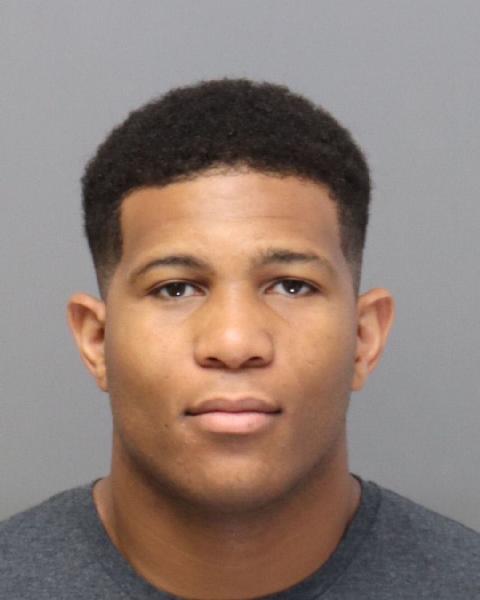Former Title IX coordinator claims she was forced out for upholding the law
Author: Greta Anderson
Go to Source
When the University of Cincinnati College of Arts and Sciences honored William Houston last December for overcoming personal and academic challenges and earning his degree, sexual assault survivors were outraged.
Houston was convicted for gross sexual imposition, a serious criminal charge, in Ohio in May 2015 while a student at Bowling Green State University and has been a registered sex offender in the state ever since. Bowling Green suspended him after determining he attempted to rape a woman in 2014. But Houston “found his home and overcame his ‘immaturity’ to graduate as a #UCArtSci student,” the College of Arts and Sciences wrote in a tweet in February promoting an article about Houston receiving a Triumph Cord, a piece of regalia given to graduating Arts and Sciences students who overcame adversity while earning their degrees. Cincinnati was the sixth college he attended.
“I vaguely remember not feeling well, having this gut-churning feeling,” Grace Cunningham, a Cincinnati grad, said about recalling the day she saw the college’s article.
Cunningham graduated in the same 2018 class as Houston and founded Students for Survivors, a campus organization that supports victims of sexual assault. She said she was raped and robbed by a former student in her off-campus apartment in 2015. She reported the rape to Cincinnati’s Title IX coordinator but could not pursue a case because the perpetrator was not enrolled at the university. She then went to local police, but her attacker was only charged with robbery, she said.
“For me, it was a reminder of everything that happened to me at Cincinnati,” Cunningham said. “This is my reality, and here they are, showing their true colors again and again. They awarded a rapist for overcoming struggle. It spoke to survivors’ experience on this campus.”
The College of Arts and Sciences subsequently retracted Houston’s profile from the article about the award after getting complaints from students and issued an editor’s note about the concerns. Female students at Cincinnati came forward on social media alleging that Houston had harassed them. University officials received a comment from a student alleging that Houston had raped a friend who was a Cincinnati student, according to an email exchange from Feb. 6 to 7 provided to Inside Higher Ed.
“I wasn’t going to say anything, but on the victim’s behalf I have to because I’m incredibly disturbed. And I can’t not write to you about this issue,” the emailer, whose name was redacted on a copy of the correspondence, wrote to Anne Bowling, assistant director of marketing and public relations for the College of Arts and Sciences. “I respected the victim’s choice not to go to the authorities, but I struggle with him being highlighted as a hero when he’s allegedly hurt a lot of people,” the emailer said, referring to Houston. “This is incredibly uncomfortable for me to write as a rape survivor myself. And I trust you to handle this at your discernment. I just need to make you aware of this complaint.” 
Houston did not reply to a request for comment.
The allegation was shared with Lisa Holstrom, senior assistant dean of the College of Arts and Sciences, and M. B. Reilly, executive director of public relations, on Feb. 6, according to email correspondence between Bowling, Holstrom and Reilly. Reilly declined to comment, and Holstrom did not respond to requests for comment.
The only Cincinnati official who acted on the complaints against Houston was Andrea Goldblum, the university’s former Title IX coordinator, according to a lawsuit Goldblum filed against the university in May. According to her complaint, she was forced to resign from her position last March, about a month after she began investigating whether Cincinnati officials knew about Houston’s conviction before accepting him to the university. Officials pushed her out in order to silence her, the lawsuit claims.
“A Title IX coordinator’s job is to uncover potential wrongdoing at a university,” said Joshua Engel, Goldblum’s attorney. “If someone like Andrea is uncovering information that is potentially embarrassing to others at the university, they can’t silence her. She’s got a protected right to raise these concerns.”
Lori Ross, Cincinnati’s vice president for legal affairs and general counsel, declined to comment, citing the pending litigation.
Title IX is part of a 1972 law that prohibits sex discrimination in educational programs that receive federal funding. The law requires colleges and universities to investigate reports of sexual misconduct and provide resources for students who experience sexual harassment or assault.
Goldblum contends that as part of her work as Title IX coordinator, she wrote a letter to the editor of the student newspaper, The News Record, that she wanted published. But before sending the letter, which expressed support for students concerned about the university honoring Houston and offered a list of mental health and sexual assault survivor resources, she sent a draft of the letter to Bleuzette Marshall, the university’s vice president for equity, inclusion and community impact. Marshall instructed Goldblum not to send the letter, the lawsuit states. After about a week of waiting for instructions on how the university should respond, Goldblum sent the letter to The News Record without permission from her superiors.
Goldblum said she felt the university “could create a hostile environment” in violation of Title IX if it did not reach out publicly to survivors, the lawsuit states. She believed she would not be doing her job as Title IX coordinator if she remained silent, according to the lawsuit. But her letter was never received or published, according to The News Record.
The letter shows that Goldblum’s email was sent to The News Record’s editorial email address, but the newspaper’s editors confirmed that they never received it and were not aware that Goldblum intended to publish a letter. Nonetheless, university officials told Goldblum on March 15 that she could willingly leave her role or she would be terminated for insubordination, the lawsuit states. Goldblum decided to resign under pressure. She is now director of student conduct and support at the Community College of Denver.
 Goldblum’s ouster occurred after she’d concluded in her own investigation that “admissions staff and the Assistant Dean of Students were all aware of Houston’s background prior to his admission, as were UC Police, shortly after his admission,” the lawsuit states.
Goldblum’s ouster occurred after she’d concluded in her own investigation that “admissions staff and the Assistant Dean of Students were all aware of Houston’s background prior to his admission, as were UC Police, shortly after his admission,” the lawsuit states.
Cunningham, the student who was in the same class as Houston, believes university officials did know about his past.
“As an institution, they’ve shown it time and time again that they don’t give a damn about survivors,” Cunningham said. “The fact that they can admit a known sexual predator — they put the campus community at risk.”
The university will attempt to get the case dismissed on the grounds that Goldblum’s actions were not within in her role as a Title IX coordinator, according to a preliminary report on the case filed Oct. 21 by Stephanie Bowman, a magistrate judge in the U.S. District Court in the Southern District of Ohio. Bowman wrote a report recommending that the district judge who will hear Goldblum’s case make a summary judgment to move forward with Goldblum’s lawsuit as a violation of Title IX.
Jake Sapp, deputy Title IX coordinator at Austin College in Sherman, Tex., doesn’t believe Goldblum violated the law.
“In my personal experience, in almost every case that I deal with, as soon as there’s any complaint or allegation made, regardless of what it is, we always include or provide resources to all parties … Reaching out to the community is definitely within the purview of the Title IX coordinator,” he said. “To not do that would very broadly be deliberately indifferent.”
Some legal experts are not convinced that Goldblum’s intention to reach out to students with available resources would constitute “protected activity” in her role as coordinator. If Goldblum could prove Cincinnati prevented her from investigating sexual misconduct or providing remedies or resources to students whose educational experience was hindered by it — duties explicitly stated in current Title IX guidance — she could be protected as a whistle-blower, said Brett Sokolow, president of the Association of Title IX Administrators, or ATIXA.
But what Goldblum did was “peripheral” to her role as a coordinator, and Cincinnati could effectively argue that they terminated Goldblum because she did not know Title IX, Sokolow said.
“Cincinnati is going to say … she wasn’t doing something that Title IX requires,” Sokolow said. “It could be seen as a coordinator jumping out as pro-victim — they could have wanted to keep her neutral.”
Title IX coordinators are not supposed to be advocates for the university or the students — their job is to uphold the law, Sapp said. Goldblum’s role was to address allegations of sexual misconduct at Cincinnati, and it was not within her scope to take a stance on whether or not Houston should have been admitted, said Stuart Bernstein, a civil litigation attorney for Nesenoff and Miltenberg, a firm that advises students accused of and disciplined for sexual assault through Title IX processes. The letter “seemed to egg on students” and was inappropriate for Goldblum to write, Bernstein said.
“I appreciate that someone may not like him on the campus in general, but that’s not the Title IX office’s responsibility,” Bernstein said. “It’s just punishing the kid again. Whatever happened at [Bowling Green], the school knew about it, and they made a conscious decision to let him in.”
Goldblum’s case is one that Title IX legal professionals do not see every day, Bernstein said. This may be just the second retaliation lawsuit filed by a Title IX coordinator in the federal courts, and while Bowman’s recommendation is likely to prompt the district judge to move Goldblum’s case forward, she faces even bigger hurdles down the road if her case makes it to trial, Sokolow said. One similar case is Kelley v. Iowa State University, which ended in a settlement between former Iowa State Title IX coordinator Robinette Kelley and the university before it reached trial, Iowa Public Radio reported. Kelley claimed Iowa State would not allow her to make housing accommodations for a student who lived in the same dorm as her alleged attacker and was not providing adequate resources to students required under Title IX.
Cincinnati has faced a number of Title IX-related lawsuits in federal court in the past few years, Sokolow said. Many of them were brought by students accused of and disciplined for sexual assault, who allege the university violated their due process rights.
Sapp argued that because Title IX is such a broadly written statute, it can be interpreted broadly to apply to Goldblum’s case.
In the meantime, Cincinnati is searching for someone to permanently fill the Title IX coordinator position. An interim coordinator who is also director of the Office of Equal Opportunity and Access now holds the position, according to the university’s website. Cunningham said she is worried about sexual assault survivors at the university not getting the support they need. The university searched for a Title IX coordinator for more than two years before hiring Goldblum, said Cunningham, who was on a student panel that helped select Goldblum.
“I have experienced a range of emotions, and I’m still processing them today,” Cunningham wrote in an email to Marshall when she learned Goldblum was allegedly forced out of Cincinnati. “I am disgusted with the fact that you forced Andrea Goldblum to resign because she was doing her job.”
